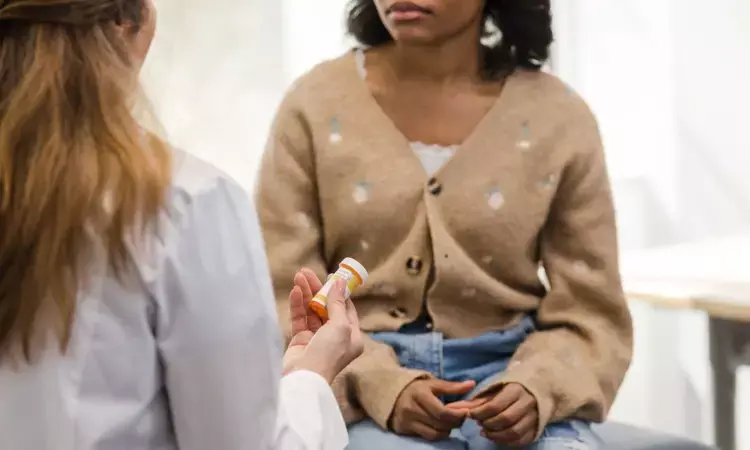- Home
- Medical news & Guidelines
- Anesthesiology
- Cardiology and CTVS
- Critical Care
- Dentistry
- Dermatology
- Diabetes and Endocrinology
- ENT
- Gastroenterology
- Medicine
- Nephrology
- Neurology
- Obstretics-Gynaecology
- Oncology
- Ophthalmology
- Orthopaedics
- Pediatrics-Neonatology
- Psychiatry
- Pulmonology
- Radiology
- Surgery
- Urology
- Laboratory Medicine
- Diet
- Nursing
- Paramedical
- Physiotherapy
- Health news
- Fact Check
- Bone Health Fact Check
- Brain Health Fact Check
- Cancer Related Fact Check
- Child Care Fact Check
- Dental and oral health fact check
- Diabetes and metabolic health fact check
- Diet and Nutrition Fact Check
- Eye and ENT Care Fact Check
- Fitness fact check
- Gut health fact check
- Heart health fact check
- Kidney health fact check
- Medical education fact check
- Men's health fact check
- Respiratory fact check
- Skin and hair care fact check
- Vaccine and Immunization fact check
- Women's health fact check
- AYUSH
- State News
- Andaman and Nicobar Islands
- Andhra Pradesh
- Arunachal Pradesh
- Assam
- Bihar
- Chandigarh
- Chattisgarh
- Dadra and Nagar Haveli
- Daman and Diu
- Delhi
- Goa
- Gujarat
- Haryana
- Himachal Pradesh
- Jammu & Kashmir
- Jharkhand
- Karnataka
- Kerala
- Ladakh
- Lakshadweep
- Madhya Pradesh
- Maharashtra
- Manipur
- Meghalaya
- Mizoram
- Nagaland
- Odisha
- Puducherry
- Punjab
- Rajasthan
- Sikkim
- Tamil Nadu
- Telangana
- Tripura
- Uttar Pradesh
- Uttrakhand
- West Bengal
- Medical Education
- Industry
GLP-1 receptor agonists use linked to increased antidepressant use: Study

Australia: In a comprehensive investigation into the relationship between exposure to glucagon-like peptide-1 receptor agonists (GLP-1 RAs) and the dispensing of antidepressants, recent research has unveiled intriguing findings that shed light on potential connections between metabolic and mental health outcomes. The study, comprising cross-sectional, case-control, and longitudinal analyses, offers valuable insights into the complex interplay between these two therapeutic domains.
The researchers revealed that individuals exposed to GLP-1 receptor agonists face a greater risk of being dispensed antidepressants. The possible impact of GLP-1 receptor agonists on the mood of consumers requires further research and ongoing vigilance. The study was published online in Diabetes, Obesity and Metabolism on April 23, 2024.
Glucagon-like peptide-1 receptor agonists, commonly prescribed for managing type 2 diabetes mellitus (T2DM), have garnered attention for their potential benefits beyond glycemic control. These agents have been associated with cardiovascular risk reduction, weight loss, and even neuroprotective effects, prompting investigations into their broader therapeutic implications.
Osvaldo P. Almeida from the Institute for Health Research in the University of Notre Dame, Fremantle, Western Australia, Australia, and colleagues aimed to determine if the dispensing of GLP-1 receptor agonists is associated with increased dispensing of antidepressants.
For this purpose, the researchers used case-control, cross-sectional, and retrospective cohort study designs to investigate the association between dispensed GLP-1 receptor agonists and antidepressants between 2012 and 2022 in the 10% random Australian Pharmaceutical Benefits Scheme (PBS) data sample.
PBS-listed GLP-1 receptor agonists, dulaglutide, exenatide, and semaglutide were the exposures. Outcomes were the odds ratio and hazard ratio of being dispensed any antidepressant. Analyses were adjusted for demographic measures and medicines dispensing to manage cardiovascular diseases or insomnia/anxiety.
The study led to the following findings:
- In total, 358 075 of 1 746 391 individuals were dispensed antidepressants, and 8495 of the 24 783 dispensed a GLP-1 receptor agonist were also dispensed an antidepressant in 2022 (OR 1.44); 24 103 of the 1 746 391 participants had been dispensed a GLP-1 receptor agonist between 2012 and 2021 and of these 8083 were dispensed antidepressants in 2022 (OR 1.52).
- The 2012 cohort included 1,213,316 individuals who had not been dispensed antidepressants that year.
- The hazard ratio of being dispensed an antidepressant between 2013 and 2022 following the dispensing of a GLP-1 receptor agonist was 1.19.
- Additional analyses restricting the exposure time confirmed these associations for all PBS-listed GLP-1 receptor agonists.
Analysis of the 10% PBS database revealed that individuals dispensed GLP-1 RAs would probably be dispensed antidepressants. The strength of the association between GLP-1 RAs and antidepressants was like that of insulin, weaker associations were also noticed for sulphonylureas, biguanides, and dipeptidyl peptidase 4 inhibitors.
The researchers found the association between GLP-1 RAs and antidepressants to be consistent, largely independent of the class of antidepressant dispensed and study design, however, the results could have been affected by the detection and prescription biases and confounding factors.
"The study findings reinforce the need for ongoing vigilance and further research about the possible mental health consequences of exposure to GLP-1 RAs," they concluded.
Reference:
Almeida OP, Fong Z, Hill Almeida LM, Sanfilippo FM, Page A, Etherton-Beer C. Cross-sectional, case-control and longitudinal associations between exposure to glucagon-like peptide-1 receptor agonists and the dispensing of antidepressants. Diabetes Obes Metab. 2024 Apr 23. doi: 10.1111/dom.15616. Epub ahead of print. PMID: 38650544.
Dr Kamal Kant Kohli-MBBS, DTCD- a chest specialist with more than 30 years of practice and a flair for writing clinical articles, Dr Kamal Kant Kohli joined Medical Dialogues as a Chief Editor of Medical News. Besides writing articles, as an editor, he proofreads and verifies all the medical content published on Medical Dialogues including those coming from journals, studies,medical conferences,guidelines etc. Email: drkohli@medicaldialogues.in. Contact no. 011-43720751


